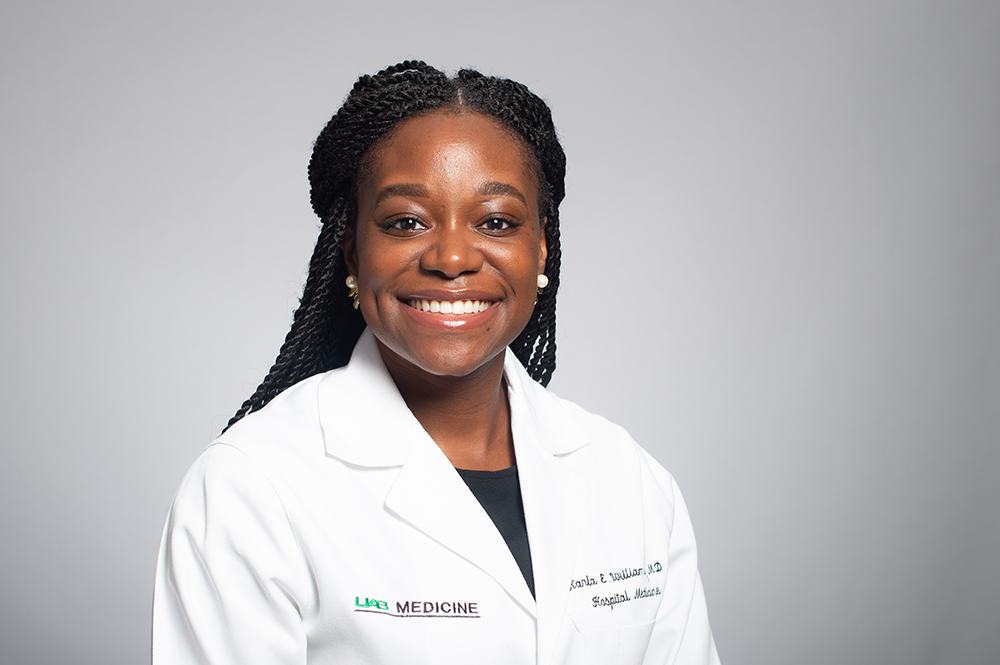By Natasha Mehra, MD (PGY-2)
 Above: Dr. Karla Williams, Assistant Professor (General Internal Medicine)
Above: Dr. Karla Williams, Assistant Professor (General Internal Medicine)
Anyone who knows Dr. Karla Williams is aware that she wears many hats around the hospital. In November 2020, she added one more to her closet when she was promoted to Assistant Program Director. In addition to her new role, Dr. Williams works part-time with the UAB Hospitalist group, is a member of the General Internal Medicine Division, and serves as the director of the Internal Medicine Program's Diversity and Inclusion Committee. She brings her zest for life and passion into everything she does.
Dr. Williams is originally from South Carolina, growing up, the youngest of four, both in Columbia and Charleston. She received her undergraduate degree from the University of South Carolina and completed medical school at Medical University of South Carolina. She then came to UAB in 2014 for her residency. Her plan was to complete her residency at UAB and return to South Carolina to be closer to her family. She was considering a career in critical care, however after realizing her love for general inpatient medicine, her plans changed. She was selected as a chief resident from 2017-18, and it was during her chief year that she decided to stay at UAB and carve out a unique path for herself. She wanted to be a hospitalist in addition to attending on the teaching service. "There is a level of distance between teacher and patient on the teaching services. I missed having one on one interactions with patients as I progressed in my residency. I missed it even more during chief year. I knew I would never be satisfied if I would only be behind the scenes," she says. She is the first faculty member with appointments in the Division of General Internal Medicine and Hospitalist Medicine, and she has since made this career a possibility for others.
Last year, she also helped create the Longitudinal Diversity and Inclusion Curriculum, along with fellow UAB alumnus Dr. KeAndrea Titer. The goal of the curriculum is to teach residents about the impact of structural racism on their patients. Championing diversity and inclusion is a passion she hopes to continue promoting as Assistant Program Director. "In my role, I hope to continue to create an environment that is open and welcoming to all residents. Not just our program. I want internal medicine to be an example for all GME programs as well. We're here not just to learn medicine. There is a science to medicine and an art to medicine. It's about understanding the art and teaching the art of medicine as it relates to diversity. It makes patients much more comfortable when you can connect with them and understand them as a person outside of the hospital," she explains.
She is a strong proponent of work-life balance and makes a conscious effort of finishing work at work, and not bringing it home with her. She has always used her calendar to organize her time, but this has become especially useful now that she has a variety of responsibilities. Despite her busy schedule, she makes time for her hobbies, which include cooking, home decorating, running, and singing. She enjoys using food subscription services, including Sun Basket, to trying new recipes. A freshly cooked dish with a glass of wine helps her unwind. Her routine and hobbies have helped make a very difficult year more manageable.
Despite the pandemic and the racial reckoning the country has been facing, she remains optimistic and focused on putting in the work. "One of the things I try to do is realize the work we are doing is important—medical education, caring for our patients, caring for friends and family, to achieve equity and justice. I try to stay focused on what I can control—the waves and ripples I can create in my sphere of impact. Everything happens for a reason. Although the last year and a half has had some very hard times, it has created platforms for us to have a voice and be active participants in voice and change. Now is the time for us to not just use our voice, but to actually do what we say we're here to do."
She feels that talking about issues is the best way to confront them. "Part of the change is starting conversation—having a safe place to have a conversation. Places that are psychologically safe places to talk about experiences. Sometimes we become overwhelmed with how grand the things that need to be done are. But look in front of you. Create experiences where people reflect on their own life. You learn more about yourself and other people when you allow them to share their experiences." She encourages everyone to check in on their friends and neighbors during these difficult times, and to lend a helping hand in whatever way they can. "Lend a listening ear; offer your support. People will be pleasantly surprised. Think about where you want to make change, and go for it."
We can't wait to see all the things Dr. Williams will do in her new role as APD!